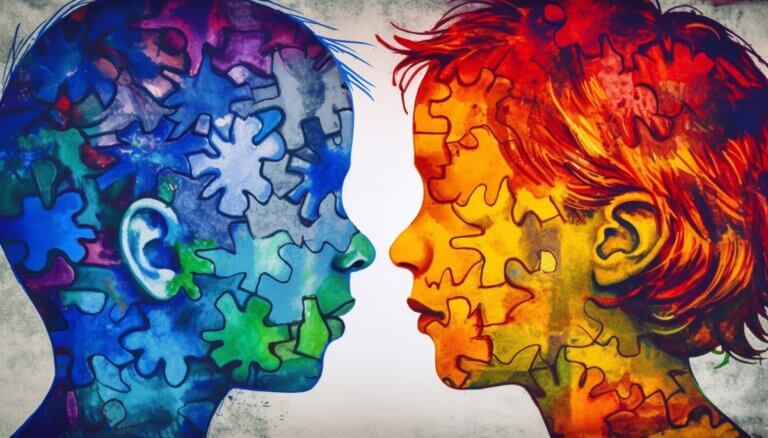Table of Contents
Emotional Intelligence in the Everyday Management of Multicultural Teams

Self-confidence and Self-reflection
In the age of global economy and cross-border projects, leaders face the challenge of orchestrating intercultural leadership and international teams. Emotional intelligence in global leadership is a key component for success and harmony. It enables leaders to develop cultural sensitivity and multicultural competence, essential for navigating a sea of global business relationships.
The Foundation: Self-Awareness as a Leader
Self-awareness is the deep understanding of one’s own emotions, strengths, weaknesses, and motivating factors. It is the basis for optimizing both one’s own performance and that of team members. For example, an emotionally intelligent leader with high self-awareness recognizes how their moods can affect the team’s work. Being aware of their impact, they can take steps to minimize negative influences and promote a positive work environment.
This ability is particularly significant when dealing with international teams. Consider a situation where a German leader tends to be very direct at the start of a project, which in their culture is seen as a sign of efficiency. In an international context, however, this might be perceived as rude or disrespectful by team members from cultures that prefer an indirect style of communication. Here, emotional intelligence in global leadership requires an adjustment of communication styles to meet different expectations and strengthen team cohesion.
The Bridge to Self-Reflection
Self-reflection complements self-awareness and helps in recognizing and adjusting one’s behavior patterns. This continuous questioning of one’s leadership role and reflecting on one’s influence on the team are crucial for adapting to cultural diversity. A leader with high emotional intelligence might reflect after a team meeting on how their words and actions were interpreted by the different cultures within the team. They continuously learn, creating a less conflict-prone and more productive work environment in future interactions.
A practical example of the impact of self-reflection would be a leader who notices that their criticism leads to insecurity rather than motivation in an international team member. Instead of adhering to a uniform, culturally influenced leadership style, such a leader reevaluates their approaches, looks for cross-culturally effective methods, and thus promotes multicultural competence both in themselves and in the entire team.
In summary, it can be stated that in intercultural leadership, the key to success lies in the emotional intelligence of the leader. Self-awareness and self-reflection enable one to understand oneself and the effects of one’s actions on different cultures, and to act accordingly. This not only benefits the individual but the entire international team.
Empathy and Intercultural Competence
Emotional intelligence plays a pivotal role in global leadership, particularly when it comes to Intercultural Leadership and managing International Teams. One of its core facets is empathy, which, in conjunction with intercultural competence, defines the ability to understand, respect, and transform cultural differences into strengths.
The Importance of Empathy in a Multicultural Context
Empathy is not just the ability to comprehend others’ feelings, but also the ability to respond to them appropriately. In a team characterized by diversity, this ability becomes essential for bridge-building between different cultural perspectives. A leader with pronounced emotional intelligence can perceive both the individual needs and the collective needs of the team. It is empathy that allows for understanding others deeply, thereby gaining a more profound comprehension of the actions and reactions of employees from different cultural backgrounds.
- Empathy fosters trust and openness in communication by creating an environment where team members feel understood and valued.
- By empathetically handling intercultural conflicts, a leader can effectively mediate and offer solutions that respect all sides.
- Empathy helps leaders to recognize not only the obvious but also the subtle cultural nuances critical for successful team dynamics.
Multicultural Competence as a Complement to Empathy
While empathy ensures emotional understanding and connection with others, cultural sensitivity is an expression of intercultural competence crucial for Emotional Intelligence in Global Leadership. It enables leaders to recognize differences in communication styles, working methods, and values appropriately. Cultural sensitivity, paired with empathy, allows for accurate interpretation of behaviors and avoids misunderstandings that could otherwise lead to tensions.
- The capability for cultural learning and adaptation lays the foundation for Multicultural Competence.
- Through active listening and questioning one’s preconceptions, a sensitive perception of intercultural differences emerges.
- Cultural sensitivity teaches us to reflect on our own cultural imprints, essential for more objective, empathetic leadership.
In practice, this means that a leader in an international company respects and values the personal festivals of an Indian employee just as much as they accept the direct communication style of a North American team member.
Practical Case Studies
This combination of empathy and multicultural competence is concretely demonstrated in cases like that of a German manager sent to Japan. Aware of the local importance of hierarchy and group harmony, the manager adapts his leadership styles, thus fostering the trust and respect of his Japanese colleagues. Similarly, it is evident in an American executive who learns not to confront business partners with direct criticism in a South American context, but instead to package it in constructive suggestions.
In all cases, it is the combination of emotional and intercultural intelligence that makes the difference between a successful and a less successful leader. It means understanding empathy and cultural sensitivity as dynamic competencies that must be continuously developed and applied in the context of global leadership.
Enhancing Team Harmony and Performance through Emotional Intelligence

Enhancing Team Harmony and Performance through Emotional Intelligence
Professional handling of conflicts is one of the key skills that international leaders must master in the era of global teams. In a work environment characterized by cultural diversity, Emotional Intelligence in Global Leadership plays a central role. Complex challenges in such teams require not only expertise but also pronounced intercultural leadership and cultural sensitivity.
Recognizing and Understanding Emotions
The beginning of emotionally intelligent conflict resolution involves recognizing and understanding one’s own emotions and those of the team members. Consider the example of a leader who heads an international project team. A conflict arises because team members from different cultures prefer different types of meetings. This discrepancy can quickly lead to misunderstandings. An emotionally intelligent leader would perceive their own frustration and use it as a signal to actively listen and grasp the perspectives of all involved.
- By managing their emotional response, the dialogue remains constructive.
- They utilize Multicultural Competence to identify different needs.
- They create a basis of trust through empathy that contributes to conflict resolution.
Strategy Development and Conflict Resolution
Another step is the development of strategies that not only resolve the conflict but also use it as an opportunity for learning. One strategy could be to introduce an open forum where all team members are encouraged to share their views in an environment of mutual respect. The leader moderates this exchange, ensures a balance between different approaches, and thus creates an inclusive atmosphere.
- Intercultural leadership means using conflicts as opportunities for development.
- This involves using Emotional Intelligence to break down barriers and foster intercultural understanding.
- The solution goes beyond resolving the conflict and strengthens the cohesion of the team.
Practical Example: Emotional Intelligence in Conflict
Finally, let’s use a real example: A project is delayed due to disagreements between departments. An emotionally intelligent leader recognizes the underlying intercultural conflict, collects feedback, and conducts a mediation session. They pay attention to International Teams and their specific dynamics. They promote constructive criticism and the development of common solutions.
- This leads to an enhanced understanding of shared and different values.
- With the help of emotional intelligence, they resolve the conflict and strengthen collaboration.
- The result is a cross-team agreement and more efficient project progress.
In global leadership, emotional intelligence must be employed in a way that enhances teamwork in a multi-layered cultural environment. It is not just about resolving conflicts but using these as occasions for growth and improving cultural sensitivity within the team.
Motivation and Influence
Emotional intelligence in global leadership plays a crucial role in motivating and influencing international teams. To act effectively, leaders must understand that each team member has their own emotional drives and cultural backgrounds, which influence how they wish to be motivated and led.
The Fundamentals of Emotional Intelligence
The ability to recognize and manage one’s own emotions and the emotions of others is the core of Emotional Intelligence. A leader with high Emotional Intelligence can communicate effectively, resolve conflicts, and create an environment that inspires members of a multicultural team. But how exactly can Emotional Intelligence be integrated into international leadership to motivate?
- Intercultural Leadership means respecting and understanding different emotional expressions. For example, a Dutch manager would be open and direct in their feedback, while a Japanese manager values harmony and indirect communication.
- Cultural sensitivity is shown when a leader recognizes the holidays, traditions, and emotional norms of the different cultures in the team.
- Multicultural competence is crucial for setting motivating goals that acknowledge diversity and enable personal growth within cultural conditions.
Emotional Intelligence and Personal Motivation
Leaders who use emotional intelligence can effectively address the individual needs of their team members. They can recognize when a team member needs support or when they are ready to take on more responsibility. This fine sense of a team’s emotional landscape is crucial for the development of international teams that adapt and grow with challenges.
Connecting Motivation Techniques
To create a common motivating vision, leaders must be able to tell stories that reflect the values and hopes of all team members – regardless of their background. An emotional connection to the common goal not only strengthens individual engagement but also promotes team spirit and collaboration across cultural boundaries.
Through effective use of Emotional Intelligence in global leadership, complemented by Cultural Sensitivity, leaders not only create an environment of individual recognition and appreciation but also foster a high-performing, collaborative, and resilient organization.
Summary
Emotional intelligence and intercultural leadership form the basis for success in the global business world. Leaders of international teams face the challenge of combining cultural sensitivity and multicultural competence with emotional skill. Understanding and managing one’s own emotions and those of team members is crucial for creating an effective and harmonious work environment. Herein lies the key role of emotional intelligence in global leadership: showing respect and seeing differences as an enrichment.
Important Components of Emotional Intelligence
Awareness of one’s own emotional world and its impacts on the team is the first step to successfully managing cultural diversity. Cross-cultural communication only succeeds when leaders adapt their communication and engage in self-reflection. Empathy, another core facet of emotional intelligence, enables leaders to feel into other cultures, thereby strengthening trust and openness in communication.
- Self-awareness strengthens leadership in assessing one’s actions and their effects on various cultures.
- Empathy promotes an inclusive climate, in which each team member feels valued.
- Cultural sensitivity prevents misunderstandings and allows for the constructive resolution of intercultural conflicts.
An example of practiced emotional intelligence and intercultural leadership is demonstrated in the adaptability of a European manager in Asia, who respects hierarchical peculiarities and group dynamics and strives for harmonious collaboration.
For the successful leadership of international teams, it is necessary to engage with the diversity of emotional expressions and to develop strategies that go beyond purely technical conflict resolution. Teams not only experience an improvement in collaboration but also growth in each individual’s intercultural competence.
- Understanding leadership – accepting and respecting the emotional and cultural diversity in the team promises more engagement and motivation.
- Connecting stories – creating a common vision that represents and connects all cultural backgrounds.
- Individual promotion – recognizing different needs and targeted personal development support.
Overall, integrating emotional intelligence into leadership practices promotes the creation of a culture of recognition and collaboration, which is essential for the successful steering of international teams. Emotional intelligence and intercultural leadership are thus more than just buzzwords; they are essential skills that make the difference between a functioning team and an extraordinary one in an increasingly connected world.
FAQ – Emotional Intelligence and Intercultural Leadership
How can emotional intelligence contribute to overcoming cultural misunderstandings in an international team?
Emotional intelligence allows us to recognize cultural differences in an international team as an enrichment and to empathically engage with the feelings and perspectives of others. This reduces misunderstandings through improved communication and the ability to interpret and respect emotional signals across cultural boundaries. With this sensitivity, we can create a appreciative and inclusive working atmosphere that strengthens collaboration and promotes synergy in the group.
How can emotional intelligence overcome communication barriers in multicultural teams and lead to more effective teamwork?
Emotional intelligence enables individuals in multicultural teams to perceive subtle nonverbal cues and the varied emotions of their colleagues and to respond appropriately. This promotes a deep understanding and respect for cultural differences, thereby minimizing misunderstandings and strengthening constructive communication. Through empathy and adaptive behavior, emotional barriers are dismantled and efficient, harmonious collaboration is encouraged.
How can emotional intelligence be practically applied in leading multicultural and international teams to reduce misunderstandings and improve collaboration?
Emotional intelligence in leading multicultural teams enables the perception of subtle differences in communication and expression of emotions, leading to a deeper understanding and respect for various cultural backgrounds. Leaders can create a climate of trust through active listening and empathy, which lays the foundation for clear, appreciative communication and minimizes misunderstandings. The ability to properly manage one’s own emotions and those of team members fosters effective collaboration and creates an inclusive atmosphere where all voices are heard and valued.




